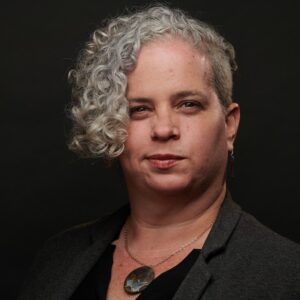The Funders Network is committed to sharing the stories and strategies of our members, partners and others in the philanthropic sector working to create more sustainable, prosperous and equitable communities. Today, we’re sharing a guest blog post from TFN member Robert Wood Johnson Foundation (RWJF) highlighting a recent conversation between Trista Harris, President of FutureGood, and Jessica Clark, Founder and Executive Director of Dot Connector Studio, about the work of professional futurists.
Over the past five years, both have served as “futurists in residence” at RWJF, working with the Pioneering Ideas for an Equitable Future team to help spot signals and trends relevant to health equity. (We also featured Trista in our April TFN webinar How to be a Future-Focused Leader…Now.) Their conversational interview focuses on Jessica’s professional development as a futurist and her thoughts around foresight in the social sector.
BY Trista Harris, FutureGood, and Jessica Clark, Dot Connector Studio
Trista: Thank you for agreeing to have this conversation with me. I appreciate your willingness to chat about your thoughts about futures-thinking as it relates to philanthropy and the nonprofit sector. I have just got a handful of questions. But first I want to hear a little bit about your futurism journey. So, how did you get interested in it?
Jessica: Oh, I have been interested in futurism since I started reading science fiction with my dad back in the ‘70s. And then I wrote a Master’s thesis in the early ‘90s on the role of women in cyberpunk literature and what those representations told us about the way the new public sphere was emerging. That was back before the internet had pictures!
Since then, I’ve kind of been ping-ponging between these three topics: public sphere, science fiction, and emerging technology. That has been my career for the last two decades
Trista: I love it! I have met so many folks who have come to futurism via sci-fi. I mean, that is the space where people are imagining what the future looks like. And I think it is such a good grounding, because they are great at creating a picture of what the future could look like: good or bad. There is a lot of bad…
Jessica: Right
Trista: But lots of folks are working on good versions of the future as well.
Jessica: Correct.
Trista: So tell me about your Futurist in Residence role at the Robert Wood Johnson Foundation. What have you been working on? What have you been doing?
Jessica: Well, the role actually sunset for me a few months ago. Currently, they have a Speculative Fiction Writer in Residence, Karen Lord.
Trista: I didn’t know that! That’s amazing!
Jessica: But I’m still working with them to try to understand the funding that they have been doing in the futurism space. They are really interested in this concept of “democratizing the imagination of the future”. Trying to bring in many different voices, and perspectives, and specializations to the question of how to achieve health equity. Then, I’m working a little bit with the communications team. They have tools like the Share Your Hunch site, which allows people to come in and submit their hunches about what they are seeing, feeling, or noticing as a way to incentivize open idea generation.
Trista: I love it. And, this is not your first time partnering with philanthropy. So, tell me how it was different to be sort of in the futurism team in a foundation as opposed to, what I lovingly call myself, “the weirdo from the outside” who’s like, Care about the future!
Jessica: [Laughing] Indeed, “the weirdo from the outside” is my middle name. So, yeah, it was great to be embedded in a team that is really devoted to innovation and very experimental and trying constantly to not only spot new trends, but also to understand the different ways that people operate in the world— from art to organizing to literature to…you-name-it! Trying to really bring all these different inputs into weekly meetings. They have an Ethicist in Residence, too. So talking about the social dimensions of futurism and innovation, which I think is pretty unusual. A lot of futurism is very corporate, or very instrumental and government-focused.
And also the grantees are just amazing. Because the team has an open portal that allows people to apply from a very broad array of spaces about projects related to the future of food, work, evidence, and other topics. They are all very different and they are all really working in whatever field they are inhabiting to try something new. So, it’s a super-lively, almost salon-like environment
Trista: I love that. And then you were a part of one of our 2023 FutureGood Studio cohorts. It was fantastic to have your expertise in that space and that was really appreciated by other participants. Can you tell us a little bit about your experience in that cohort? What were some highlights for you?
Jessica: I thought it was very thoughtfully designed. There were a lot of nice little touches, like you sent out a package for all of us to make tea together and just sort of have a virtual social hour. There were a lot of nicely designed materials. It was really well put together, especially for people who are new to the space and might find it intimidating. And you had an interesting cross-section of practitioners from non-profits, philanthropy, and other social good endeavors. So, it wasn’t just similar pathways people were exploring; there were various ways to incorporate these concepts into their lives and their work. And there were a few things…I mean, I have read a lot of futurism books [laughing]…
Trista: [Laughing] Yeah!
Jessica: So, I was familiar with some things. But there were also a few things which stuck with me. One was the idea of skipping the problem, both for mental relief and to generate creative solutions.
Trista: Mmm hmm.
Jessica: Which is very hard for those of us who are problem-focused! [Laughing]
Trista: Yes!
Jessica: To think about what if the world were actually what we had been fighting for this whole time. What would we do then?
Then the other one is thinking exponentially, which I always have a hard time with — even though I have witnessed just tremendous exponential change over the course of my career and, of course, all of our lifetimes.
Trista: [Laughing] Says the person who referenced “the internet without the photos,” so yes, you’ve seen it!
Jessica: I wonder if it’s almost a gender training or, maybe a non-profit mindset to not think exponentially, to be kind of humble.
Trista: Yeah.
Jessica: Whereas our world is actively changed all the time by people who are heedlessly thinking exponentially without any regard to the impact on other humans. So, those of us with some sort of a mission need to learn to do that as well — not just leave it up to the Elon Musks of the world.
Trista: Yes. I think you’re right. Like, this idea of don’t look at us, we’re just doing little things over here, both as a gender thing and as a non-profit sector thing of, like, don’t put your head up too high because it might make people nervous about the work you’re doing. So everything winds up sort of under the radar. And that is not how you solve big problems!
So, how do we get out of that space and really claim the future we want to create? As opposed to constantly responding to the Elon Musks of the world and going No, not that! Oh my God, please not that!
Jessica: Non-profit work is gap-filling work. It is also bringing-people-up-who-don’t-have-resources work.
It often tends to be, even if it is replicable, small scale or marginal, by definition. So how do we use some of the positive aspects of art and fiction writing and the most audacious activist visions we can tap into to think not just about fixing the problem, but also actually enjoying our lives?
Stuff like thriving, you know, doing things that are beyond the bare minimum or beyond the gap being filled, as if it were some road surface we were repairing.
Trista: I used to run a social justice foundation and when Obama was elected, everybody’s strategy had been fighting against. And, so, then he was elected and the strategy remained fighting against. And I was like, You know the person that, like, runs this federal agency — call them and tell them what you want! They are trying to partner with you! And, we’ve lost that ability – to build instead of stopping things from being built.
It is really beautiful when people have a picture of the future that they want to create that is equitable and serves people well. Like, Talk about that. That’s the piece that I think has really been missing in the sector.
Jessica: Yeah, I agree. I mean everyone right now of course has their heads in the election. And that not only is very short-sighted and very personality-focused, but it puts too much power into the hands of elected officials to shape what we feel is possible, to be more visionary and hopeful.
Trista: They’re not around long enough to create the long-term future that we need and, yet, we put in their hands, like, What’s it gonna look like for my grandchildren? And they are like, I am totally focused on this media cycle. [Laughs] It’s completely broken – what we need for the long term future.
So tell me a little bit about why a foundation leader should build their futurism skills? Why should they care about the future?
Jessica: There are different reasons. One is what we just said, they need to get out of the news cycle and the crunch and the panic and the crisis. To move out of reactivity and into creativity.
Trista: Mmm hmm.
Jessica: Also foundations have luxury, they can set a long term agenda if they want. They might have to answer to their boards — but there are relatively unfettered roads in front of them if they decide that they want to be leveraging things to affect long-term, generational futures.
Also, it’s just refreshing. Being a funder is a weird identity — people are constantly gnawing at you with their needs or their perspective on what the thing is and how you should solve it. It’s just nice to be able to take a step back and say, What are we really trying to do here? What do we really want here? Especially with your grantees or with your community — that would be the way to do it. It is not always to be in the funder-grantee mindset but to be really thinking about the end users.
Trista: Yeah. I love it. I love it!
—
About the Authors
 Jessica Clark is a futurist focused on media, culture and democracy, and the founder/executive director of Dot Connector Studio.
Jessica Clark is a futurist focused on media, culture and democracy, and the founder/executive director of Dot Connector Studio.

Trista Harris is a Philanthropic Futurist and President of FutureGood.
Header: Photo by PIRO4D is licensed under CC BY-NC-SA

This conversation between Trista and Jessica was quite nice to read through. I especially resonate with the points about the importance of non-profits in our societies. And how they are often filling needs that are left unsatisfied by the what’s available. Thank you for the interesting points.